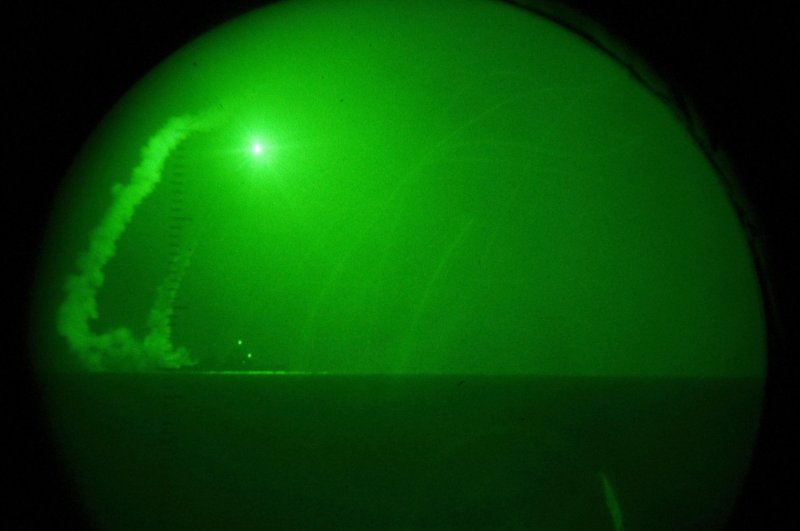This U.S. Navy photo taken on March 19, 2011 with a night-vision lens shows a Tomahawk cruise missile as it is launched from the guided missile destroyer USS Barry in support of Operation Odyssey Dawn, Marh 19, 2011. This was one of approximately 110 cruise missiles fired from U.S. and British ships and submarines that targeted about 20 radar and anti-aircraft sites along Libya's Mediterranean coast. Joint Task Force Odyssey Dawn is the U.S. Africa Command task force established to provide operational and tactical command and control of U.S. military forces supporting the international response to the unrest in Libya and enforcement of United Nations Security Council Resolution 1973. UPI/NAVY |
License Photo
LONDON, March 30 (UPI) -- The U.N. Security Council resolution authorizing military force in Libya doesn't necessarily preclude arming rebel forces, the British prime minister said.
The Security Council passed Resolution 1973 approving a no-fly zone over Libya. The measure, passed March 10, also authorizes the use of "all necessary measures" to protect unarmed civilians from attacks by forces loyal to Libyan leader Moammar Gadhafi.
Members of the Western coalition involved in enforcing the no-fly zone offer varying interpretations of the specifics of the resolution's language.
British Prime Minister David Cameron said Wednesday during questioning before members of Parliament that Resolution 1973 could allow for the arming of rebel forces fighting Gadhafi loyalists.
"The legal position is clear -- the arms embargo applies to the whole territory of Libya -- but at the same time UNSCR 1973 allows all necessary measures to protect civilians and civilian populated areas, and our view is that that would not necessarily rule out the provision of assistance to those protecting civilians in certain circumstances," he said.
He added that although the resolution provides a certain degree of leeway, London hasn't yet made a decision to arm Libyan rebels.
Deputy Prime Minister Nick Clegg told leaders in Mexico that Libyan intervention was justified as part of an emerging "axis of openness" in North Africa and the Middle East.
Clegg said Western allies learned from the Iraq invasion that military action should always be supported by multilateral action and driven by humanitarian concerns.
"Liberal vigilantism is dead," he said. "Law-abiding liberal interventionism is not."





